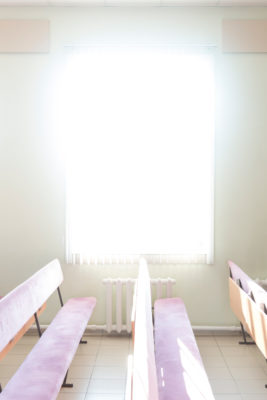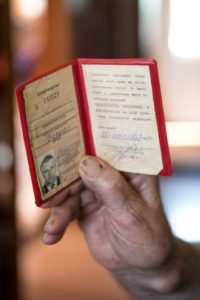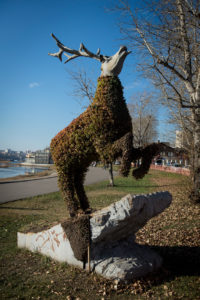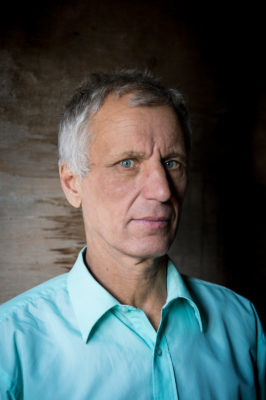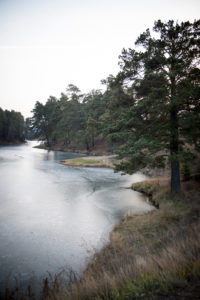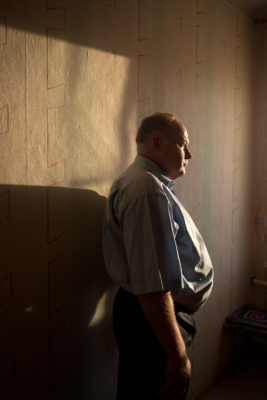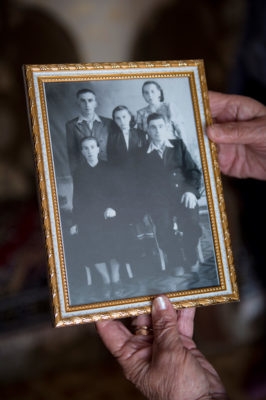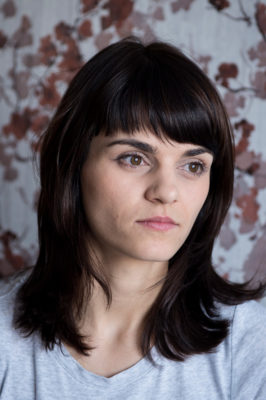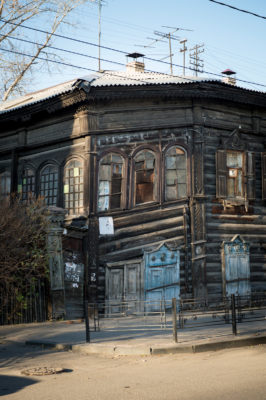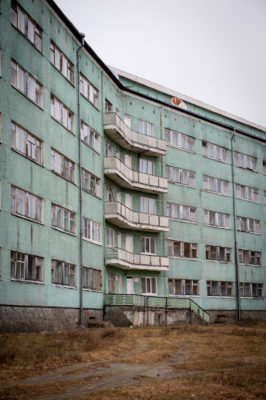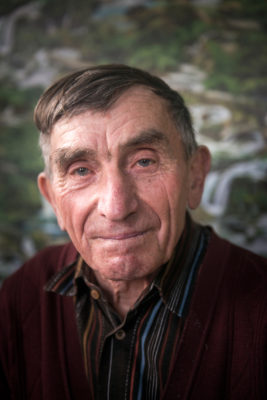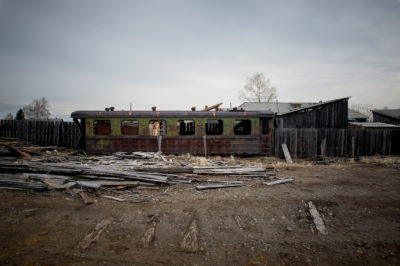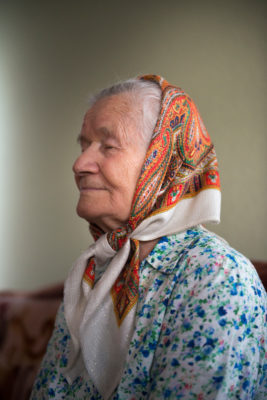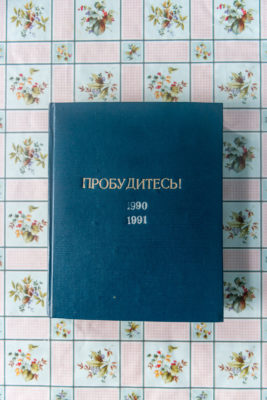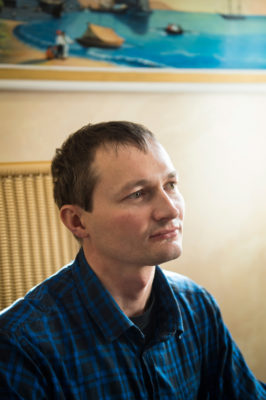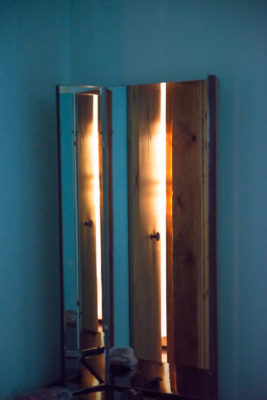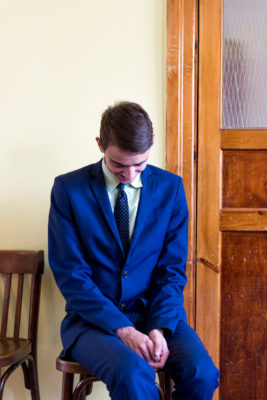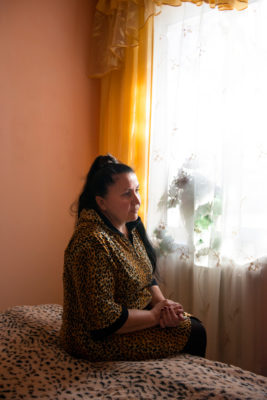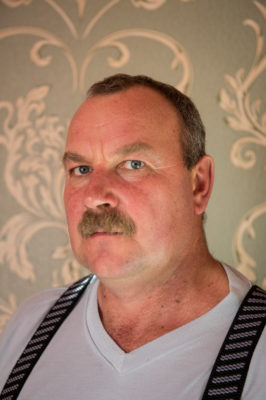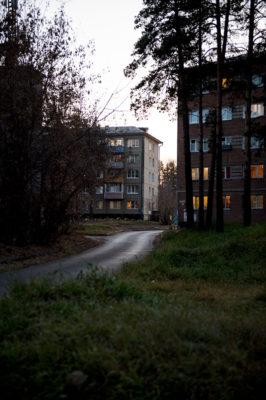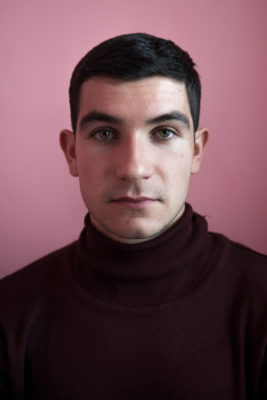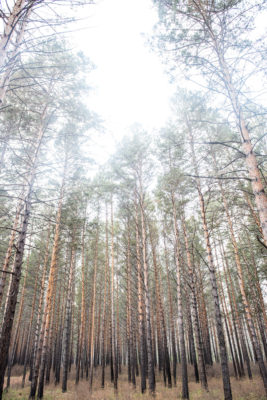4 febbraio 2018
TOGETHER WITH EMANUELA | Matthew 10.22
Kingdom Hall ofUsolye-Sibirskoye.The kingdom halls are the Jehovah’s witnesses places of worship. The Kingdom Hall of Usolye-Sibirskoye was the first to be built in Russia. The July 2017 verdict declared the JW as extremists, and the Kingdom halls of Russia were closed but at the moment the Usolye-Sibirskoye kingdom hall has been registered in the name of a JW association in Southeast Asia to protect it from the likely seizure of its assets by the state.
Stepan, 87. Irkutsk.Certificate of rehabilitation.In 1951, by decree of Stalin reading the Bible had been declared illegal and for this reason JW meetings took place hidden at night . During these meetings Stepan met Maria and in 1962 the couple got married. Under Stalin before, and then during the period of the Soviet Union, the JW were considered American spies (the movement was born in the USA), so they could not access higher education or occupy important job positions. Stepan was a bus driver throughout his life and Maria worked as a waitress. After the fall of the Soviet Union Mary and Stepan were issued the Certificate of Rehabilitation by the state with which they were declared “good citizens” and readmitted in the Russian society, as well as many other JW exiled in Siberia. The verdict from the Supreme Court in July 2017 declared again the JW as extremists, something which did not catch them by surprise. Despite all this the strength of their faith has not changed but what is now impossible for them is to gather with all the members of the congregation in the kingdom halls to preach freely from house to house. As in the years of the USSR, weekly meetings are still held in private homes for small groups of 10-15 people. Their relations with neighbors not belonging to the JW movement, who consider them as good people, have not changed at all.
Irkutsk, Siberia.Capital of the Oblast region, nearly one million inhabitants of whom about 6000 are Jehovah’s Witnesses. At the time of the Soviet Union the JW were deported from all over the state in this region who, at that time, were already persecuted. The city is divided into 12 congregations of about 100 JW each. After the verdict in July 2017, which declared the JW as extremists, the two kingdom halls were closed, the publications seized and preaching became illegal.
Boris, 58. JW.Usolye-Sibirskoye.Boris and Alla are siblings and they were both born in Siberia. At the age of 6, Alla was taken away from her mother and brought to an orphanage, where she remained until she was 13, when she could decide for herself and go back home. Their father had been imprisoned with the false accusation of having torn her ear off. Her one-year-old brother Boris was protected by her uncle, who was not a JW, and he lived with Alla’s grandmother until she returned home. Boris had suffered from psychological and physical mistreatment by the teachers and his classmates because he was a JW, and he could not graduate because he did not want to attend the lessons in which he was taught military art, so he has worked as a mechanic all his life. Instead, she was a seamstress. They deemed the Supreme Court verdict in July 2017, which declared the JW as extremists, as a tremendous historical event, and they would not want to go back to the Soviet Union times. The draft law on removing the parental authority of minors from parents declared religious extremists frightens them, and it makes them fall back to the nightmare of when Allawas a child.
Forest.Irkutsk Oblast.One of the main activities that was intended for the JW deportees in Siberia was woodworking (larch, cedar and FIR) to support the construction of the railroad, new cities and the industrial and economic growth.
Vyacheslav, 57. JW.Usolye-Sibirskoye.Vyacheslav’s wife began studying the Bible with the JW in 1993. After 12 years Vyacheslav decided to convert too, he was baptized and he became one of the senior members of the congregation. He is a former soldier and he comes from Kazakhstan. For this reason when he got to Usolye-Sibirskoye he started working at the local aeronautical military base. Along with him other 5 fellow soldiers had become JW. For his retirement he was assigned by the army the house where he currently lives with his family. He’s a teacher today. He has three children of whom Iliya is the youngest. He fears that the government might approve the draft law that is going to remove the parental authority of minors from parents declared religious extremists.
Sofia,73 and Maria, 80. JW.Angarsk.Sofia and Maria are sisters and they come from Ukraine. They belong to the third generation of JW. Their father began to study the Bible in 1942 in Poland and he was imprisoned in 1950 for having refused military service. The year after Sophia and Mary, together with her mother and elder brother, were deported to Russia. They arrived in Siberia (Oblast of IRKUSTK) at Kitoj station, where they lived in a shack shared with 6 other deported families of JW for a long time. Their mother had been forced to perform heavy jobs such as loading and unloading firewood at the station for years to support her family, until their father was able to reach for them and replace her in the job. In 1992, with the fall of the USSR, the JW were rehabilitated and readmitted to the Russian society. None of the families deported to this area returned to their home country. Everyone decided to stay and founded the first JW community of Angarsk. Sofia never married and lived with her mother until her death. Mary got married and had two children: Tatiana and Andrej, who still live with her but do not share her JW faith. Both were shocked by the decision of the Supreme Court in July 2017, which declared the JW as extremists: for them it is as if the history repeats itself.
Katia, 31. JW.Usolye-Sibirskoye.Katia is the only JW in her family. She comes from the north of Siberia, where her parents and brother still live. They are worried about her safety after the Supreme Court verdict in July 2017, which declared the JW as extremists. Her brother is a soldier and among his tasks he has to control and report the suspicious movements of the JW of his city. Katia lives in Usolye-Sibirskoye with her husband Timothy and his family. They have a 5-month-old child and are worried because they fear the government will remove custody from parents declared religious extremists.
Irkutsk, Siberia.Capital of the Oblast region, nearly one million inhabitants of whom about 6000 are Jehovah’s Witnesses. At the time of the Soviet Union the JW were deported from all over the state in this region who, at that time, were already persecuted. The city is divided into 12 congregations of about 100 JW each. After the verdict in July 2017, which declared the JW as extremists, the two kingdom halls were closed, the publications seized and preaching became illegal.
Illegal film of JW pubblicationscollections. Usolye-Sibirskoye.Photographic films used to reproduce the printed material about the JW banned during the Soviet Union Era. Each family could print the publications to be used for prayers and preaching using these films. Following the fall of the USSR the printed material was liberalized. Since 2009 the JW’s publications are again banned in Russia but this time they have been replaced with digital material thanks to the use of Internet and tablets though the films are still jealously being looked after by some JW families.
Oblast of Irkutsk, Siberia.Sanatory.At the time of the Soviet Union the JW were deported from all over the state in this region who, at that time, were already persecuted. After the verdict in July 2017, which declared the JW as extremists, the two kingdom halls were closed, the publications seized and preaching became illegal.
Stepan, 83. JW.Usolye-Sibirskoye.Anna and Stepan, of Ukrainian descent, were deported with their mothers to Siberia when they were only children. They got to Irkutsk Oblast, where they lived for three years in a shack shared with 4 other JW deported families. Their fathers had been taken prisoners and sent to hard labor in the north of Siberia for failing to sign the statement by which they were asked to deny their own JW faith. After a few years Anna’s father succeeded in rejoining the family, but he died tragically at work being crashed by a pile of wood under her daughter’s eyes (1959). Three weeks before, on 3rd October, 1959, Anna’s brother was imprisoned and she remained alone with her sick mom and the support of Stepan. Anna and Stepan, always in love, got married in 1960 in Kitoj. After the release of Anna’s brother all 4 moved to Usolye-Sibirskoye to reach for the other JW who worked there as bricklayers. They have always been accustomed to living under the control of the KGB and with heavy restrictions on freedom of religion, for this reason the Supreme Court verdict in July 2017 does not frighten them.
Tsentral ‘Nyy Khazan.Siberian village of Irkutsk Oblast.It is a Siberian village of Irkutsk Oblast initially intended for the deportation of unwanted ethnic and religious groups by the Soviet Union. Starting from 1949 Japanese, Lithuanian, Polish and finally, in 1951, the JW were deported here. The JW group lived the area called “Holy Baracs”, 8 km away from the city. They were in all 60 families. Today there are about 40 individuals out of a total population of 1500 inhabitants.
Galina, 85. JW.Tsentral ‘Nyy Khazan.She is from Ukraine, on the border with Poland. Since her family was very large (10 children) she was not deported (not all her siblings were JW and some even served in the army). Her fiancé, however, was deported to Siberia, to Tsentral’nyy ‘ Nyy Khazan in 1951 and the following year he was arrested and sentenced to 25 years of imprisonment for “anti-Soviet activities based on his religious beliefs” (art. 58 Part 11). When he was released 5 years later, he began to write her asking her to catch up with him. Despite the situation of control and constriction, Galina decided to reach him and a few months later they got married. They had 5 children and lived in the shacks 8 km away from the city until the children had to start school. Only then they moved to a house in the village. Galina has not still lost her courage, she continues to preach and the ban against the JW, ordered by the Supreme Court in July 2017, does not frighten her.
JW illegal pubblicationscollections book.Despite the fact that from 2009 the JW publications were once again declared illegal and keeping copies constituted a criminal offence, some families decided anyway to jealously look after these collections of publications collected during the freedom years.
Edi, 31. JW.Angarsk.The youngest son of Victor Popovic. He lives in Angarsk with his wife. His father Victor was born in prison in Ukraine, where his mother had been locked up at the fifth month of pregnancy because of her faith in the JW movement. For the first 2 months they were kept together, until his mother was sent to a field of work in the Urals and Victor in an orphanage. His father, also a JW, was arrested as he had refused military service and was deported to a field of work in Irkusk Oblast. The family could only meet four years later when Victor was 7 years old. In 1967 Victor officially entered the JW community receiving the sacrament of Baptism, and in 1970 he was arrested because he was accused of anti-Soviet propaganda by means of his preaching activity. His father was again arrested at the age of 40 for refusing to do military service for a second time. In 1974 he met a JW girl named Galina who would become his wife that same year. In 1978 they moved to Angarsk, where her parents, also deported, lived. In his life Victor worked as a driver and mechanic and Galina worked as a seamstress. They had 4 children,all JW. After the Supreme Court verdict in July 2017, which declared the JW as extremists, Victor is concerned but thinks that this persecution will serve to make the religion and the JW message even more known.
Tsentral ‘Nyy Khazan.Siberian village of Irkutsk Oblast.It is a Siberian village of Irkutsk Oblast initially intended for the deportation of unwanted ethnic and religious groups by the Soviet Union. Starting from 1949 Japanese, Lithuanian, Polish and finally, in 1951, the JW were deported here. The JW group lived the area called “Holy Baracs”, 8 km away from the city. They were in all 60 families. Today there are about 40 individuals out of a total population of 1500 inhabitants.
Dimitri. Irkutsk.The youngest nephew of Stepen and Maria In 1951, by decree of Stalin reading the Bible had been declared illegal and for this reason JW meetings took place hidden at night . During these meetings Stepan met Maria and in 1962 the couple got married. Under Stalin before, and then during the period of the Soviet Union, the JW were considered American spies (the movement was born in the USA), so they could not access higher education or occupy important job positions. Stepan was a bus driver throughout his life and Maria worked as a waitress. After the fall of the Soviet Union Mary and Stepan were issued the Certificate of Rehabilitation by the state with which they were declared “good citizens” and readmitted in the Russian society, as well as many other JW exiled in Siberia. The verdict from the Supreme Court in July 2017 declared again the JW as extremists, something which did not catch them by surprise. Despite all this the strength of their faith has not changed but what is now impossible for them is to gather with all the members of the congregation in the kingdom halls to preach freely from house to house. As in the years of the USSR, weekly meetings are still held in private homes for small groups of 10-15 people. Their relations with neighbors not belonging to the JW movement, who consider them as good people, have not changed at all.
Usolye-Sibirskoye.It’s a city at 80 km from Irkutsk. It was important in the second post World War period for its chemical and mechanical industries. The first JW Congress of Russia was held at Usolye-Sibirskoye stadium and the first house of the Kingdom of the whole country was built here. Today the city counts 5 JW congregations.
Baikal lake.Irkutsk Oblast.At the time of the Soviet Union the JW were deported from all over the state in this region who, at that time, were already persecuted. After the verdict in July 2017, which declared the JW as extremists, the two kingdom halls were closed, the publications seized and preaching became illegal.
Galina, 52. JW.Tsentral ‘Nyy Khazan.Both Galina and Aleksei are the fourth generation of JW of their families, which were deported on the same train from Ukraine to Siberia in 1951. They got married in 1989. Since 1991 they have finally felt free to profess their religion with prayers and preaching. But following the Supreme Court verdict in July 2017, with which the JW in Russia were declared as extremists, they can no longer do so. If they were found in possession of banned material or to preach the Bible, they would risk fines, seizure of goods and several years in prison. They live in Tsentral’nyy ‘ Nyy Khazan, a village of about 1500 inhabitants in Irkutsk Oblast, which is split between those who support the JW and those who are hostile.
Sauna.Irkutsk Oblast.At the time of the Soviet Union the JW were deported from all over the state in this region who, at that time, were already persecuted. After the verdict in July 2017, which declared the JW as extremists, the two kingdom halls were closed, the publications seized and preaching became illegal.
Aleksei, 51. JW.Tsentral ‘Nyy Khazan.Both Galina and Aleksei are the fourth generation of JW of their families, which were deported on the same train from Ukraine to Siberia in 1951. They got married in 1989. Since 1991 they have finally felt free to profess their religion with prayers and preaching. But following the Supreme Court verdict in July 2017, with which the JW in Russia were declared as extremists, they can no longer do so. If they were found in possession of banned material or to preach the Bible, they would risk fines, seizure of goods and several years in prison. They live in Tsentral’nyy ‘ Nyy Khazan, a village of about 1500 inhabitants in Irkutsk Oblast, which is split between those who support the JW and those who are hostile.
Angarsk.Irkutsk Oblast.City founded in 1948 as an industrial pole. It was initially a secret city, which was not on the maps, as it was a place where military weapons were produced. It is today very important because the Transiberian stops there as well as being the headquarter of the most important refinery of Irkutsk Oblast (Angarsk Petrochemical Company-Rosneft). During the Soviet Union era, many deportees arrived in Siberia at Kitoj train station, located on the northern outskirts of the city on the Angarsk river. Today the population is about 300,000 inhabitants, of whom 550 JW, are gathered in 5 congregations.
Vlad, 23. JW.Tsentral ‘Nyy Khazan.Yan and Vlad are Galina and Aleksei’s sons. They live in Tsentral’nyy ‘ Nyy Khazan. Yan attended Law and Economics College and at present he works as an IT expert and computer teacher in the local school.Vlad has just finished the civil service (the JW object to the military service) during which he worked as a postman. He would ike to become a mechanic. Despite the ban, even in the months of his civil service, he continued to preach door to door while carrying out his duties as a postman. “If you hang around with all the other guys, at some point you feel like a “white sheep”, because some start to smoke, drink, go to parties, sometimes they make use of drugs. We JW do not do that, and we never feel alone because we are surrounded by our brothers and companions of faith.”

